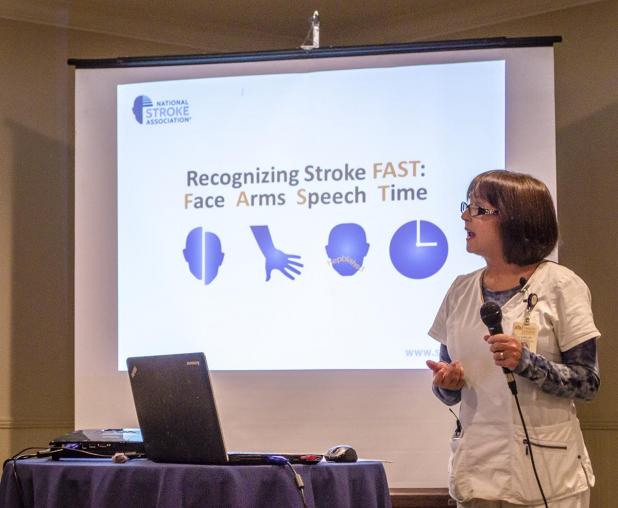
Foundation Hospital's Siracusa speaks on stroke awareness
Cathy Siracusa, RN, and Franklin Foundation Hospital’s employee health/education coordinator spoke about stroke awareness Tuesday at the Franklin Rotary luncheon.
Strokes are the fifth leading cause of death in the US.
A stroke occurs when one of the blood vessels carrying blood to the brain is blocked, or bursts, causing the death of the brain cells in the area of the brain deprived of the blood it requires.
Siracusa stressed “timing” as a factor of pinnacle importance in awareness and treatment of a stroke.
According to the National Stroke Association, during the course of a stroke, brain cells die at a rate of 200 million per minute.
The faster a stroke is diagnosed, the faster it can be treated, and the better are the chances for recovery.
To help in remembering the symptoms of, and to preliminarily diagnose a stroke, Siracusa advocates the use of the acronym: FAST. The F stands for “Face: Ask the person to smile. Does one side of the face droop?” The A stands for “Arms: Ask the person to raise both arms. Does one drift downward?” The S stands for “Speech: Ask the person to repeat a simple phrase. Does the speech sound slurred or strange?” And lastly, the T stands for “Time: If you observe any of these signs, it’s time to call 9-1-1.”
Siracusa said that most strokes can be treated if diagnosed within three hours of initiation, and that if any of the symptoms described in the FACE acronym are present, the likelihood of a stroke being in occurrence is 50 percent.
From January to August of 2017, FFH has employed its TeleStroke system in 20 cases. The system works to identify the type of stroke the patient is having, and treats the stroke accordingly, if able to be diagnosed in time. Of the 20 consults by TeleStroke at FFH, 10 cases were diagnosed as ischemic, the most common type of stroke, and of those ten cases, four cases were able to be administered a tissue plasminogen activator to break up the clot, and showed improvement.
Siracusa also discussed prevention of strokes. She said that being aware of one’s family history of strokes, looking after one’s diet, abstaining from smoking cigarettes, abstaining from or limiting alcohol consumption and remaining Diabetes and heart disease free, are all significant ways to vastly improve one’s chances of not having a stroke.
People who are 55 or older are at a more elevated risk of stroke than others, as are those who have previously had a stroke, or have Diabetes, high blood pressure, circulation problems or cholesterol buildup.
The NSA also notes that more women die of strokes, than do men. Though, women have a lower risk before menopause.
Siracusa stressed that if you are alone and think you may be showing the symptoms of a stroke, calling 911 instead of driving yourself to the emergency room, is the safest method of seeking treatment.
For more information about stroke diagnosis, treatment and prevention, contact the National Stroke Association at 1-800-787-6537, or visit www.stroke.org.
